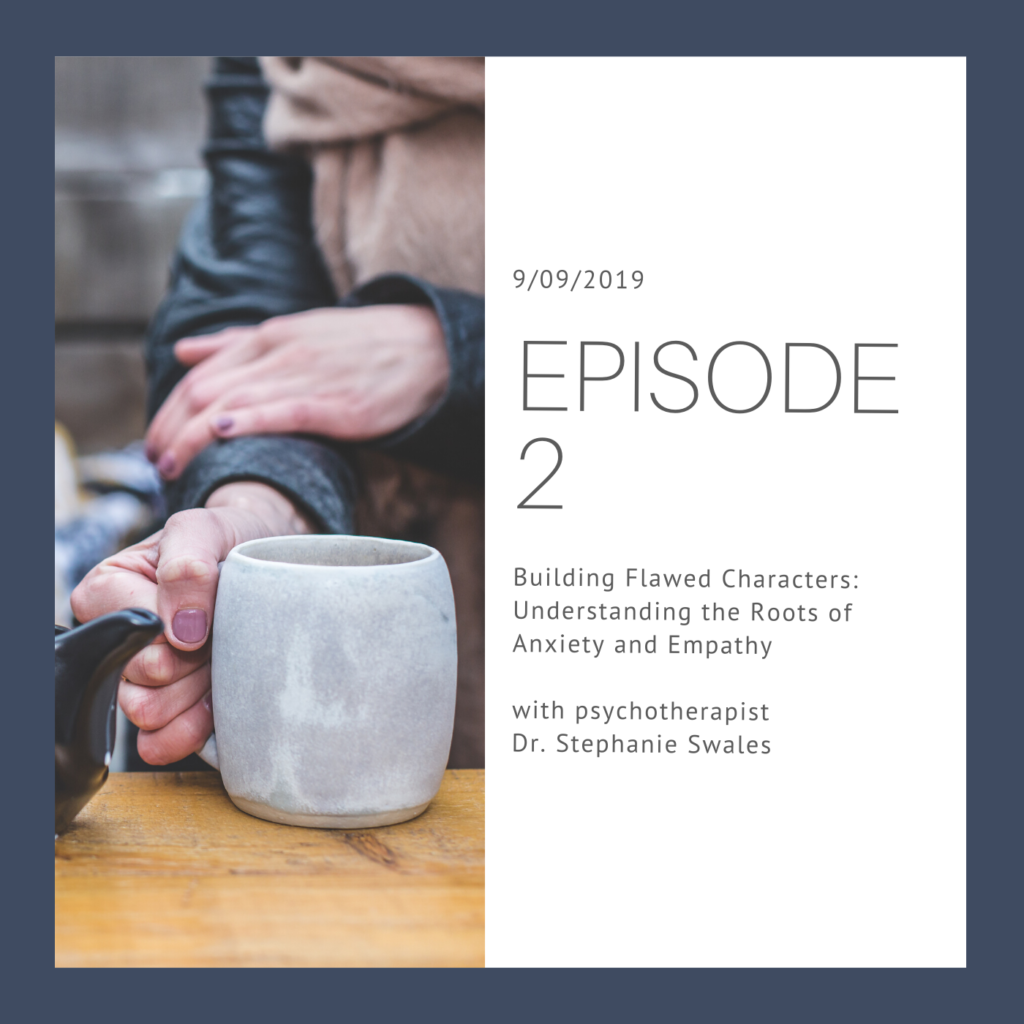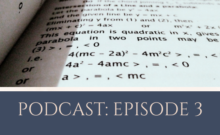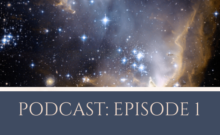Podcast: Play in new window | Download

In this week’s episode, I explore the roots of anxiety and empathy with psychotherapist Dr. Stephanie Swales as I work on designing a compelling and complex character for one of my current WIPs.
It’s impossible to separate character from plot or from world, so when you are considering the research needs for your project, don’t forget about your characters! Thinking about their occupation or incidentals like where they live or their accent are all important to nail down. But the aspect of their character that will drive the plot isn’t really any of these things; it’s their internal disposition. What motivates their actions? How do they make decisions, and why?
Because the world of my current WIP is the externalization of the internal landscape of a character who is tormented by anxiety and who has a strong sense of empathy, I needed to get really clear on these two things in order to design the scenarios that she will face, and to understand how to craft her responses in a way that is authentic and real.
Here are some of the highlights of our discussion:
- Lacanian psychoanalysis is distinct from the methods of Freud or Jung. One of the key concepts here for me was the emphasis on “lack” in order to understand desire. Lacan says that we are fundamentally desiring other beings — we always want something more, or something else — and we can only experience desire if we recognize that we are missing something.
- Lacanian psychotherapy doesn’t involve lengthy conjectures by the analyst about the analysand’s internal state; instead, it’s best for the patient to come to awareness on their own. We touch on the power of suggestion here and the necessity of epiphany for healing.
- I asked Dr. Swales about a definition of anxiety from Hallie Lord’s book On the Other Side of Fear, which is that anxiety is living in the wreckage of a future that hasn’t happened. Because science fiction writers (especially the ones working in dystopian fiction) make their living in the wreckage of an imagined future, this definition was intriguing to me. We talk about the temporality of anxiety — the connection between past experience, the present moment, and the anticipation of the future.
- We discuss the ways in which anxiety is the “universal affect” — which means that it can be a manifestation of a different (perhaps more socially unacceptable) emotion, such as anger. (This is where my wheels really started turning in terms of my character development!)
- Anxiety can belie a much deeper latent wish. For instance, a child who is terrified that her mother may be killed in a car accident may be harboring some deeper desire for distance from her mother and this is the only way she can imagine the situation being resolved. The deeper wish is for a resolution to the problem in the relationship, not that her mother would actually be killed in a wreck.
- Resolving anxiety is not usually something that can be accomplished by healthy practices such as meditation or deep breathing. Deeper work is often necessary to resolve the underlying issues.
- We discuss the true nature of empathy, which is often portrayed popularly as a kind of superpower (think Mantis from Guardians of the Galaxy vol. 2).
- Of the three kinds of empathy — cognitive, emotional, and compassionate — emotional is the one which can most quickly turn harmful.
I came away from this conversation with a profound new awareness of the possibilities in creating a character who struggles with anxiety and an unhealthy empathic sense. Simply labeling her as “anxious” didn’t really get to the heart of her character. Now that I can put her through some psychotherapy to get to the root of things, I think she will be a deeper character, and the adventure she experiences will also be more profound.
What are some of the ways you have worked on understanding your characters and their motivations? Are there characters in books or movies that you feel are particularly well-drawn and deep? Let me know in the comments!
Additional resources:
- “Being Empathetic is Good, But It Can Harm Your Health.” The Washington Post.
- How to be Brave — Brene Brown with Marie Forleo episode of MarieTV. (Language warning).
- For an interesting article that walks the line between empathy as a way to build connection and empathy as a “superpower”, check out this article on being a physical empath in Psychology Today.
Books and movies:*
- On the Other Side of Fear. Hallie Lord. This discusses the experience of anxiety from the perspective of a Catholic struggling with faith.
- I Thought It Was Just Me (But It Wasn’t). Brene Brown. This is a work on perfectionism and compassion.
- Guardians of the Galaxy, Vol. 2.
I hope you found this episode informative and helpful! As always, I’d appreciate your rating and review on iTunes. You can also click the button to support the show.
Become a Patron!Until next time, happy reading and happy writing!
Stay wonder-filled,
S.K.
*Links to products or other resources may be affiliate links, where I receive a small percentage should you choose to purchase. I only share products or services that I have used personally or come recommended by people I know and trust.



Leave a Comment